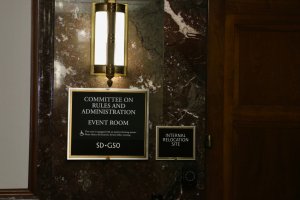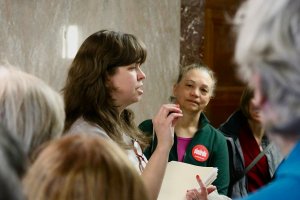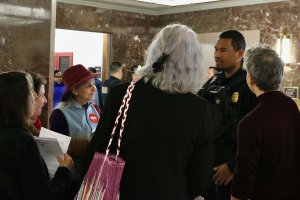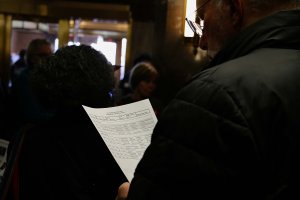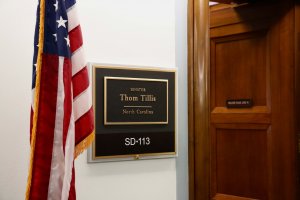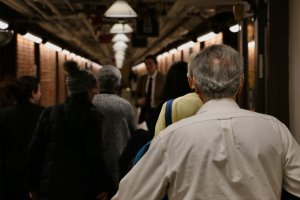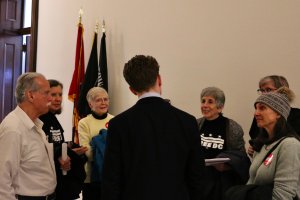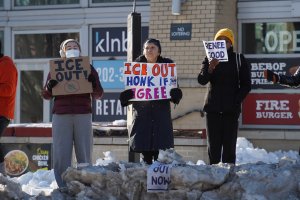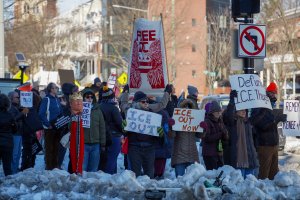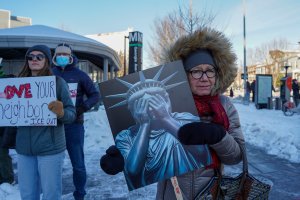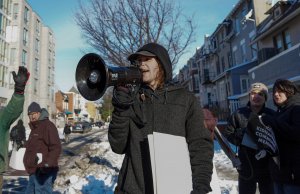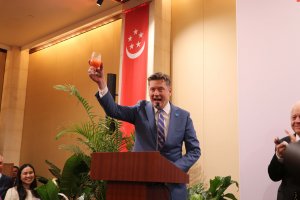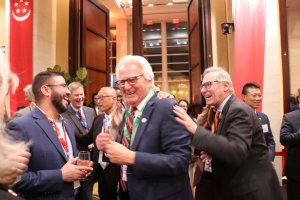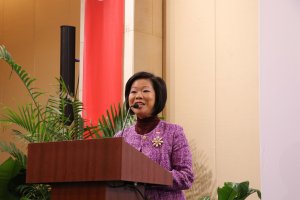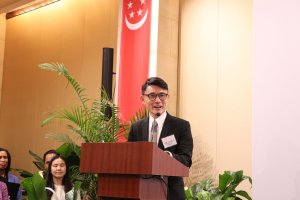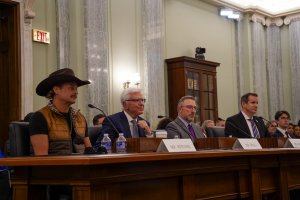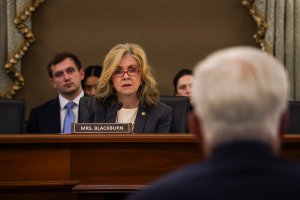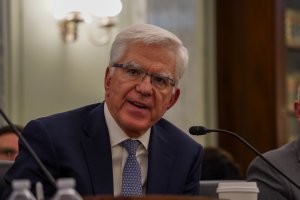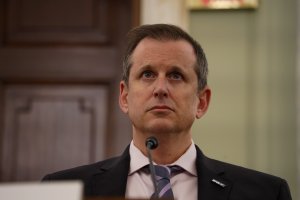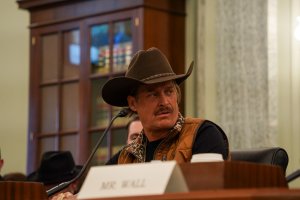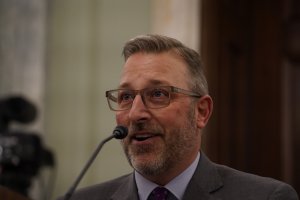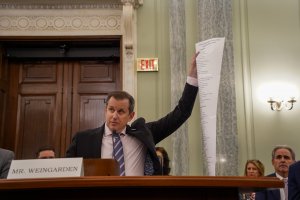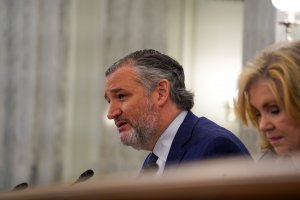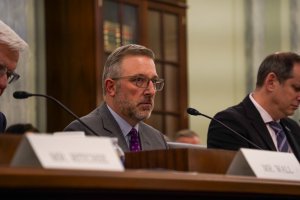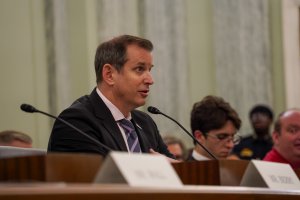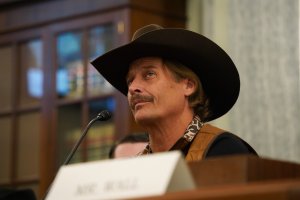Politics
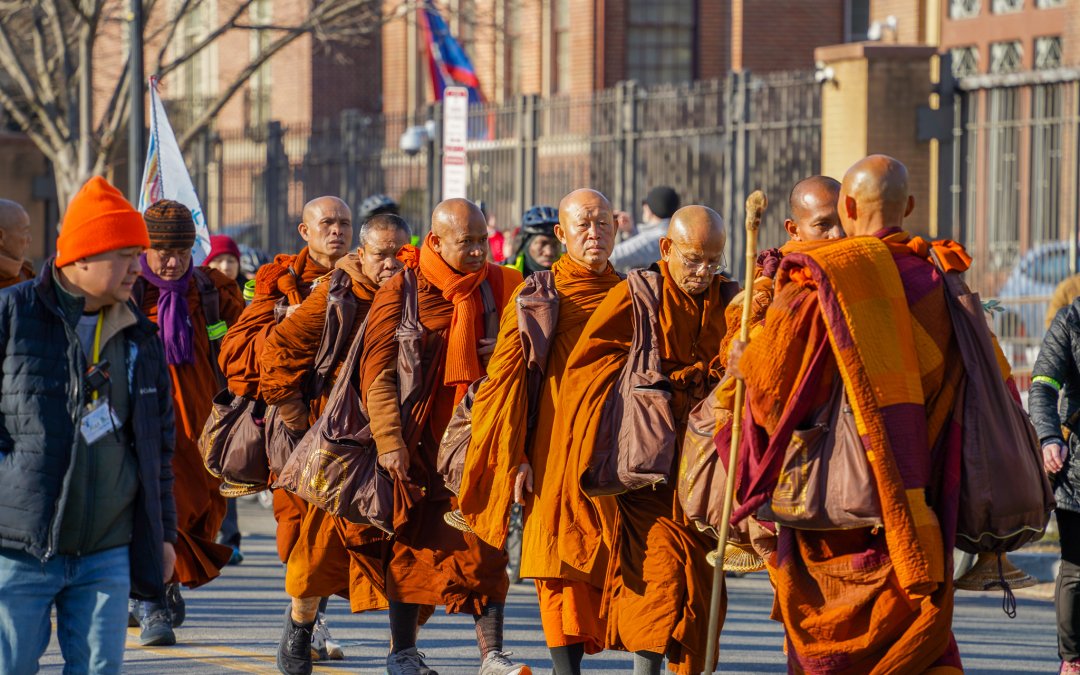
In Photos: ‘Walk for Peace’ Buddhist monks complete Unity Walk on Embassy Row
Buddhist monks arrived in Washington on the 108th day of their national pilgrimage.
read more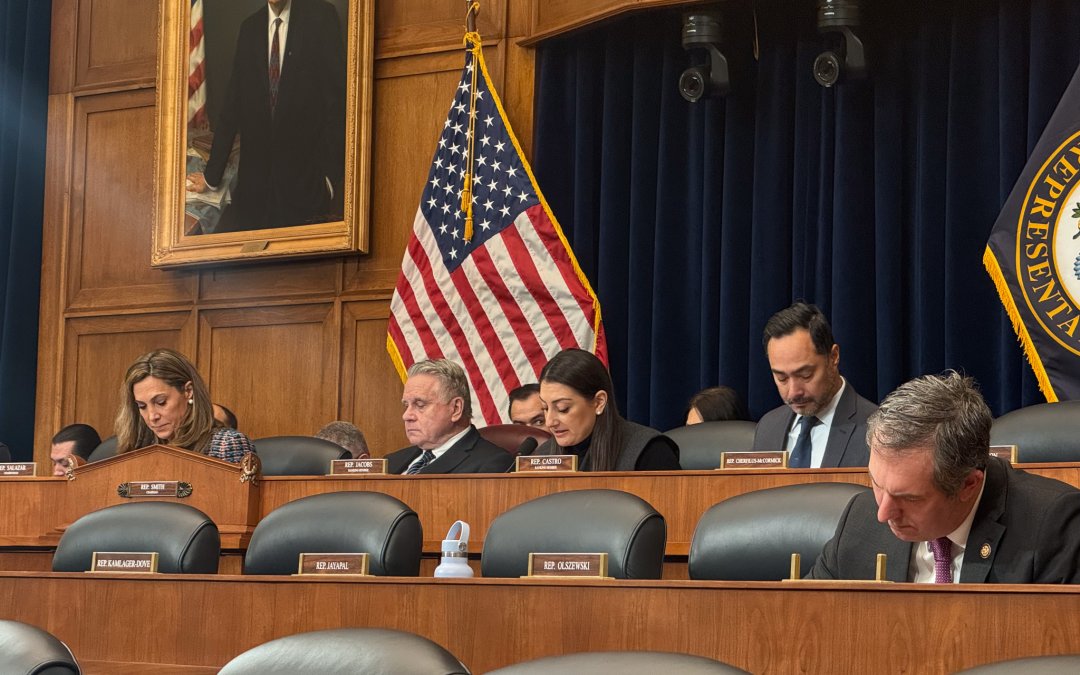
Christian persecution takes center stage amid religious freedom concerns
Congressional witnesses called for action to support international freedom of religion amid attacks on church leaders and religious groups—but the road to action seems unsure.
read more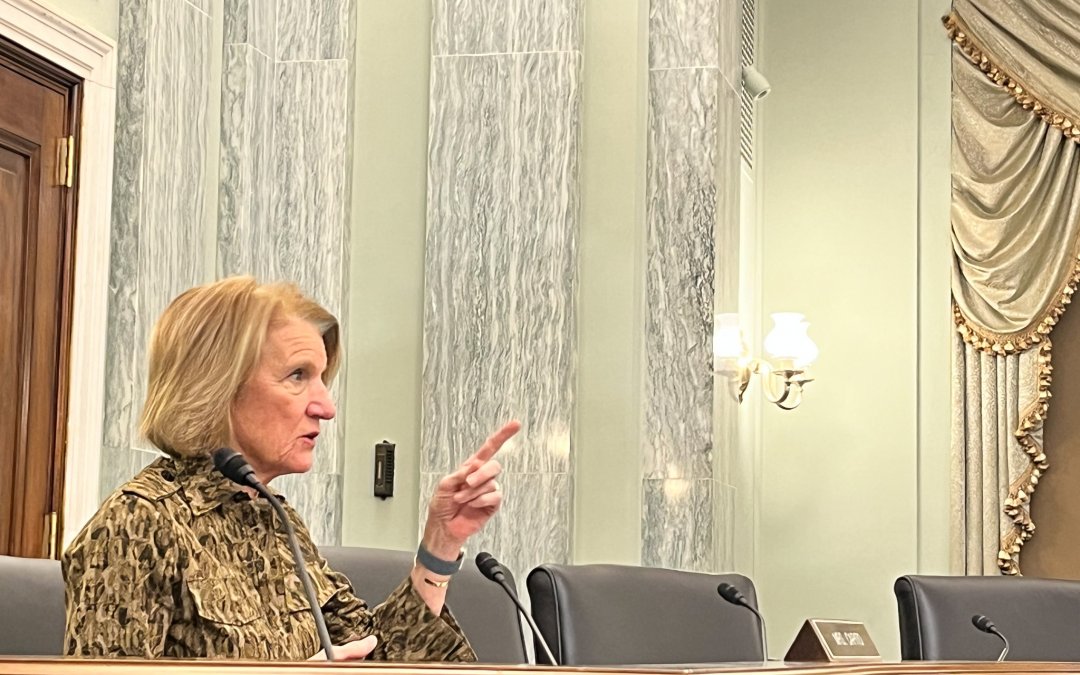
Senators evaluate television ownership cap, consider effects on local news amid potential Nexstar-TEGNA merger
GOP, Dems debate protecting local news from the impact of artificial intelligence.
read more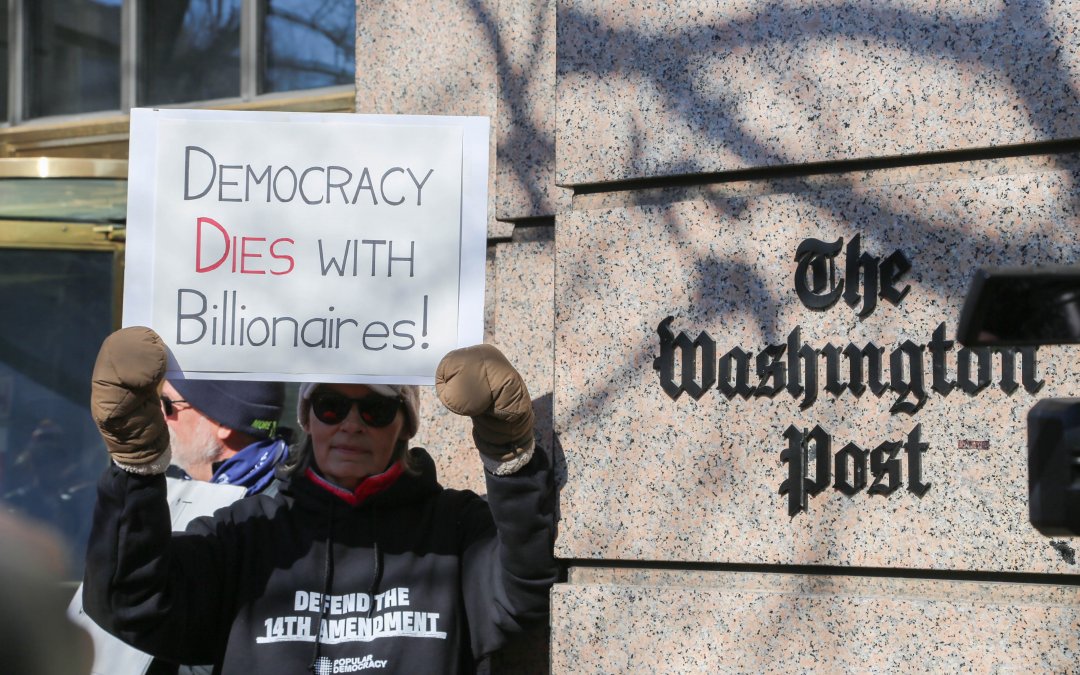
Washington Post layoffs spark concern about future of journalism, billionaire owners
After the Washington Post laid off at least a third of its staff last Wednesday, journalists and news consumers expressed anger over Bezos’ decisions and concern about the state of the industry.
read more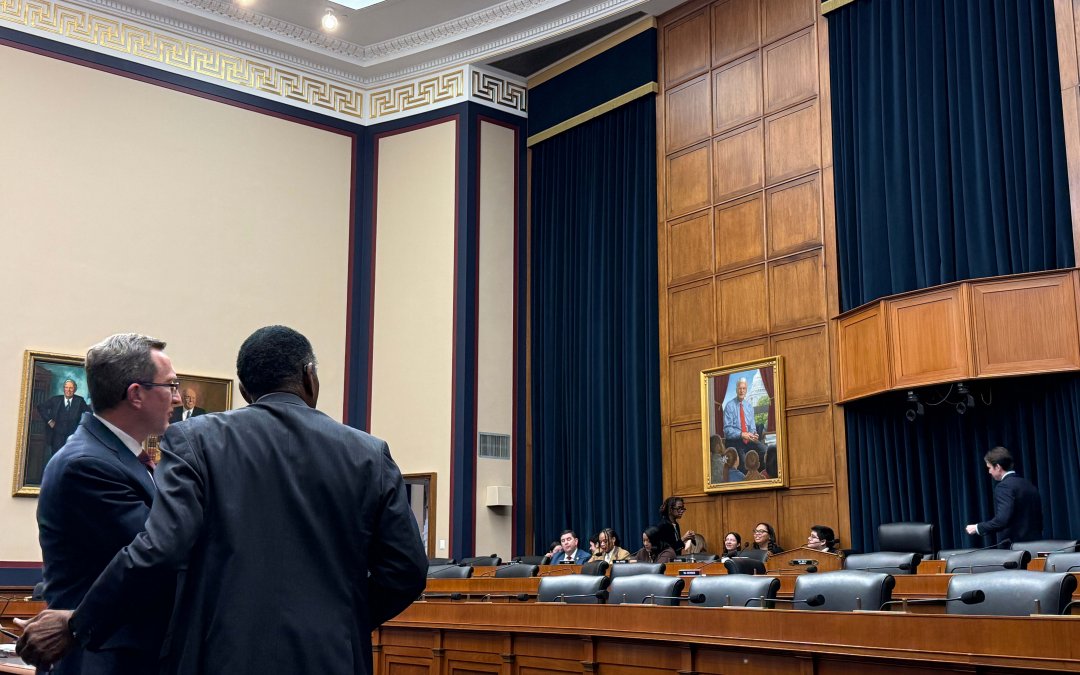
Repubs and Dems clash over parental opt-out rights in education after Supreme Court ruling involving LGBTQ+ books
A House subcommittee debated parents’ right to opt their children out of lessons because of religious conflicts in public schools, after Mahmoud v. Taylor ruling.
read moreListen: Free DC members protest against congressional resolution to overturn DC law
WASHINGTON — On Wednesday, the House of Representatives passed a resolution to overturn parts of D.C. law. Before this vote, around 40 members of Free DC gathered in U.S Senate office buildings to talk to lawmakers and protest the resolution.
Many attendees saw the resolution as a small part of a larger problem regarding D.C.’s autonomy.
Listen to the full story here.
Millions spent, benefits delayed: VA faces scrutiny over digital GI Bill
WASHINGTON — Bi-partisan lawmakers accused the Department of Veterans Affairs’ representatives of mismanagement at a hearing on the digital GI Bill on Wednesday morning, since the program’s cost has ballooned and veterans have faced delayed education and housing payments.
“You have to take responsibility for the continued delays and the skyrocketing costs on behalf of the American taxpayers,” said Rep. Derrick Van Orden, R-Minn., chair of the House Veterans’ Affairs Subcommittee on Economic Opportunity. “Student veterans deserve a reliable, moderate system, and taxpayers deserve assurances that their investment is worthwhile.”
Delays in digital GI Bill benefit payments first surfaced after the VA rolled out a new claims system in August and September, causing thousands of education stipends to fall behind schedule. This is the latest blow the VA has faced within a decades long series of disruptions. The agency serves millions of veterans each year by covering tuition and fees, monthly housing allowances, healthcare, disability benefits and job retraining, according to data on VA’s webpage.
By November, the federal government shutdown exacerbated the problem, leaving students without timely housing payments for housing and slowing claims processing to up to 49 days, according to FedScoop. The disruptions impacted approximately 75,000 beneficiaries.
Rep. Chris Pappas, D-NH, said administration officials need to take accountability for such failures.
“When are we, as a committee, gonna practice what we preach?” Pappas said.
William Hubbard, vice president for veterans and military policy at Veterans Education Success, said while VA was aware of the possibility of these issues before students and veterans felt the impact of the delays, there was no proactive warning or reliable channel for students to get answers.
“One student told us that her benefits were missing for nearly three months. Her car was repossessed and she was facing eviction while attending school out of state with no family support nearby,” Hubbard said.
However, Executive Director at Education Service, Veterans Benefits Administration Kenneth Smith said VA acknowledged its mistakes in September 2024, and has made significant improvements to its digital GI bill processing systems.
Since January 2026, the average processing amount of days for veteran claims was 5.6 days, Smith said. 65 percent of those claims were processed without any human action with a 97 percent accuracy rate, he said.
Van Orden asked how long it took the VA to be awarded a contract since they received $453 million to develop the digital GI Bill.
Smith said he was not certain what the timeline was.
“Okay, I’m not asking, I’m telling you. You’re gonna give me that answer, because you guys have a 0 percent record of doing this stuff on time,” Van Orden said.
Managing Director and GI Bill Program Manager Justin Parke said that based on the information the agency had at the time, he felt VA had a “reasonable” response. With hindsight, however, more time would have been helpful, Parke said.
Van Orden also suggested the VA establish a contingency system to protect veterans when major technology failures disrupt payments. He said the department should set aside funds to issue emergency payments if claims processing breaks down.
“I don’t care if it goes, you know, electronically, mail on the check, because hopefully by the time the check gets there, the system is back online again,” Van Orden said.
Van Orden said if needed, he and Nikki Budzinski, D-IL, can discuss the potential of legislating that change. He said Congress should not put bureaucracy above those who served their country.
“It ain’t about you,” Van Orden said. “It’s about the veteran.”
In Photos: Free DC challenges Republican move to block D.C. tax changes
WASHINGTON — Residents of the District of Columbia moved through House and Senate office buildings to challenge joint resolutions introduced by Rep. Brandon Gill, R-Texas, and Sen. Rick Scott, R-Fla. The measures would overturn a D.C. Council-approved tax law passed in December 2025, rolling back provisions related to income tax conformity, tipped wages, depreciation rules and the restoration of the District’s child tax credit.
GOP senators slam Minnesota fraud, press for SCAM Act
WASHINGTON — Republican senators vowed to crack down on Minnesota fraud suspects during a Senate Judiciary Committee hearing on Wednesday, citing a wave of child care fraud scandals in the state and beyond. The push drew fierce opposition from Democrats over enforcement tactics targeting immigrant communities.
In January, the Department of Homeland Security deployed thousands of ICE agents to Minnesota, partly in response to alleged welfare fraud involving immigrant Somali communities. Amid nationwide protests after federal agents killed Minneapolis residents Renée Nicole Good and Alex Jeffrey Pretti, Democratic senators argued that the Trump administration is using fraud as a pretext to advance a broader immigration crackdown.
Republicans, however, maintained that revoking citizenship in cases of fraud is a warranted and necessary form of prevention, with Sen. Eric Schmitt, R-Mo., introducing the Stop Citizenship Abuse and Misrepresentation (SCAM) Act. If enacted, the legislation would allow the federal government to deport immigrants involved in “substantial fraud” against government welfare or assistance programs.
Subcommittee chair Sen. Ted Cruz, R-Texas, opened the hearing with a heated denunciation of Minnesota officials, claiming they deliberately turned a blind eye to welfare fraud and even retaliated against efforts to expose it. He urged attendees to look at the witness table, emphasizing that officials, including Governor Tim Walz and Attorney General Keith Ellison, chose to “hide out” despite being invited to testify.
Ranking member Sen. Sheldon Whitehouse, D-R.I., pushed back against Cruz’s accusations.
“What a strange thing it is to have a hearing about Minnesota that doesn’t address what’s on the front page of every newspaper about Minnesota, the violent and unwelcome federal occupation of its largest city,” Whitehouse said. “That may explain why elected officials in Minnesota have something better to do today.”
Whitehouse pointed out the irony of holding a hearing about fraud that doesn’t address the “colossal fraud” orchestrated by the Trump administration, including President Donald Trump’s 34 felony counts related to business fraud.
Robert Weissman, co-president of the nonprofit advocacy group Public Citizen, echoed that view. He said that while fraud exists in Minnesota, it is not unique to the state.
“The subtitle of this hearing is ‘Dealing with Fraud in Minnesota and Beyond,’” Weissman said. “When it comes to corporate fraud or scams perpetrated by those close to the administration, the policy is to ignore, forgive or coddle the wrongdoers if they’re actually caught.”
He added that the Trump administration’s actions have undermined efforts to prevent fraud by diverting the FBI from its fraud investigations to immigration enforcement.
Weissman later found himself in a charged exchange with Cruz, who argued that Democrats have a tendency to deflect from the facts of what is happening in Minnesota.
“I get you want to testify how much you hate Donald Trump, but I’m quite certain Donald Trump was not running a fraudulent daycare center or a fraudulent autism center in Minnesota,” Cruz said.
David Hoch, an independent investigative journalist featured in YouTuber Nick Shirley’s videos, which are credited for first breaking the Minnesota fraud claims, described the extent of fraud in Minnesota.
He recalled seeing misspelled signs and a lack of children’s footprints in the snow during his investigation of child care facilities. He said many centers posted hours that would have required two licenses despite only having one.
“The way we fix this is that the federal government has to go to the Minnesota Department of Human Services and every social service agency and say, ‘Look, if you issue a payment using federal money and it goes to a fraudulent company, you run the risk of us coming in, arresting you, handcuffing you, parading you out, bringing you in front of a judge and putting you in prison,’” Hoch said.
Amid the partisanship, Weissman identified a divide over the importance of fraud across the aisle.
“The Republican senators are focused on a case in Minnesota they think is politically helpful for them, but are oblivious to the far greater fraud that is going around in the country that is centered in the Trump administration itself,” Weissman told Medill News Service. “Of course, everyone says they’re against fraud, but I do not credit in general that they actually care about it. If they did, I think they would be doing different things.”
In Photos: ‘ICE Out For Good’ protesters gather in freezing temperatures
WASHINGTON — Amid freezing temperatures, demonstrators gathered at the intersection of Georgia Avenue and Petworth Sunday afternoon for an “ICE Out For Good” protest. The protest, led by college senior RJ Doroshewitz, was organized by Indivisible, a nationwide organization that “empowers local groups to defend democracy.”
About 100 protesters gathered on all four corners of the intersection for over an hour, waving signs and participating in group-led chants. Many signs encouraged passing drivers to honk in support of the movement. Police cars were parked at every corner of the protest, but no police action occurred.
The George Washington University student led chants with a megaphone, such as “No collaboration, end the occupation.” The megaphone was handed to various protesters throughout the demonstration. One protester used a bongo play along to the beat of the chants.
In Photos: From Dancing to a Free Round Trip, US Mayors Deepen Ties With Singapore and each other
WASHINGTON — The U.S. Conference of Mayors held an event at the Singaporean embassy on Thursday night where mayors mingled in tents and viewed exhibits and performances showcasing Singapore’s culture and governance.
There were costumed performances, traditional food and a round‑trip ticket giveaway to Singapore for one lucky Mayor.
Jeffries emphasizes need for changes at ICE ahead of possible government
WASHINGTON — House Minority Leader Hakeem Jeffries, D-N.Y., called for immediate and dramatic changes at U.S. Immigration and Customs Enforcement in a press conference Thursday.
Jeffries’s comments come as the Senate works to avert a partial government shutdown. If a deal is not reached, the partial shutdown would start at 12:01a.m. on Saturday.
A minibus spending package containing six bills passed the House last week. Democrats are pushing for the bill funding the Department of Homeland Security, which oversees ICE, to be separated from the five other appropriations bills. Any changes senators make to the bill would need to go back to the House, which is currently out of session this week, for a vote.
Jeffries said an overhaul must be made at DHS before any appropriations bills regarding the department or ICE proceed.
“Dramatic changes need to occur as it relates to the way in which DHS agents generally, and ICE specifically, have been conducting themselves,” Jeffries said. “Taxpayer dollars should not be used to brutalize American citizens, to kill the American people or to violently target law-abiding immigrant families.”
House Democrats support the Senate passing the other bills in the minibus and the president signing them into law, Jeffries said.
“The failure to do so will simply be another indication that Republicans, once again, want to shut the government down in order to try to jam their extreme right-wing policies down the throats of the American people,” Jeffries said.
He added that if the Senate comes to a deal, House Democrats will need to evaluate it “in its totality.”
Jeffries also said there should be independent investigations when DHS officials commit crimes. State and local authorities should have the ability to conduct an independent investigation into crimes committed by DHS agents, he said.
Jeffries added that there should be a ban on the deportations of American citizens.
“We should have an explicit prohibition that DHS cannot detain or deport American citizens. Period. Full stop. The American people support it,” Jeffries said.
Jeffries also called for the firing of Department of Homeland Security Secretary Kristi Noem. He said that impeachment charges would follow if she were not fired.
“She needs to be put on ice permanently,” said Jeffries about Noem. “She’s got to go.”
In addition to Noem, Jeffries said that Homeland Security Advisor Stephen Miller should be removed. He added that Miller is a “malignant, unelected interloper” and was “the architect” of President Donald Trump’s “toxic immigration policies.”
“So when we evaluate the administration’s intentions, we’re not interested in a change in tone,” said Jeffries. “We’re interested in a change in behavior on the ground in American communities across the country, and as it relates to the people who are around Donald Trump.”
In Photos: Kid Rock and Ticketing representatives appear before Congress, targeting ticket resale and rise of bots
WASHINGTON — The Senate’s subcommittee on Consumer Protection, Technology, and Data Privacy brought in the singer Kid Rock and representatives of the ticketing industry to debate the resale ticket market and the unfair practices of bot ticket purchasing.
Chair Sen. Marsha Blackburn, R-Tenn., said, “The artist-fan connection is the foundation of the industry, but the ticketing industry has exploited this connection.”
Native American leaders endorse draft bill to protect native children
WASHINGTON — Native American tribal leaders, advocates and policy experts expressed strong support Wednesday for a draft bill aimed at providing justice and protections for Native children. Speakers emphasized the need for federal support of culturally responsive justice systems and welfare programs to amend longstanding disparities affecting Native youth.
During a Senate Committee on Indian Affairs hearing, senators heard testimony from representatives as they examined Title II of the draft Native Children’s Commission Implementation Act. The hearing followed Chairman Lisa Murkowski’s, R-Ala., proposal of the bill in August 2025.
Native Americans face some of the highest rates of crime and involvement with the justice system in the country. The draft bill seeks to remedy these inequities through provisions that safeguard the wellbeing of Native American children and families.
“This committee has built a strong record documenting the serious public safety challenges across Indian country, especially the persistent gaps in law enforcement,” Murkowski said in her opening statement. “We’ll continue that important work, and it’s just as important that we focus on the resources that communities need before law enforcement becomes involved, and to support families and victims after that involvement occurs.”
Title II of the bill, titled “Justice for Children, Youth, and Families,” addresses juvenile justice, domestic violence and crime. The title also codifies the Tiwahe Demonstration Program within the U.S. Department of the Interior. The Tiwahe program is a Bureau of Indian Affairs model that integrates tribal practices, customs and values into the delivery of essential services. In 2015, six tribal sites were chosen to pilot the program for five years, including Fort Belknap Indian Community.
Joan Johnson, a council member representing the Fort Belknap Indian Community, underscored the need to codify the Tiwahe program.
“For Fort Belknap, Tiwahe is not just a line item in a budget,” Johnson said. “It’s the cornerstone of our success in protecting our most sacred resources, which are our children.”
Johnson commended the program’s flexibility, saying its implementation has allowed the Fort Belknap Reservation to shift from “one-size-fits-all federal mandates” and develop responses that reflect the reservation’s unique culture, traditions and spirituality.
Hawaii Correctional System Oversight Commission Chair Mark Patterson revealed that despite being incarcerated at up to six times the rate of white women, Native women are least represented in the data that influences federal policy because they represent a small fraction of the overall population. Patterson said correcting this imbalance is the “spirit of Tiwahe.”
“When we invest into Tiwahe, we invest in justice systems that heal rather than harm, and that honor the cultural wisdom and sovereignty of the communities they serve,” Patterson said.
Witnesses also pointed to higher rates in tribal youth incarceration to highlight the importance of Title II’s provisions to establish a Tribal Advisory Committee on delinquency prevention.
“We support passage of the Native Children’s Commission Implementation Act because our youth are significantly over-represented in the federal justice system,” Spirit Lake Tribe Chairperson Lonna Jackson-Street said. “We urgently need help for our children to avoid such incarcerations, which often expose them to drug dealers and other serious offenders.”
Jackson-Street cited the ongoing Missing or Murdered Indigenous Persons crisis, which refers to the disproportionately high rates of Indigenous people who go missing or are killed. She paid tribute to lives lost and urged the implementation of a model law enforcement cooperation agreement that would help U.S. attorneys coordinate search and rescue efforts.
With senators on both sides of the aisle showing support for the Native Children’s Commission Implementation Act, StrongHearts Native Helpline executive director Lori Jump expressed hope that the legislation would be a step in the right direction in remedying inequities in the justice and welfare system for Native American children.
“It’s a start,” Jump told Medill News Service. “Does it balance it out? No. But I think it’s a great start and it really will make a huge difference in Indian country.”
Senators unite on need to solve unfair ticketing practices by automated bots
WASHINGTON – Live Nation executive, Dan Wall, on Wednesday told senators that despite his company’s measures to fend off millions of automated bots, they are not able to stop them from excessively increasing the prices of resale tickets.
“We’re fighting back with the most sophisticated defenses out there, including most recently, identity verification,” Wall told the Senate’s subcommittee on Consumer Protection, Technology, and Data Privacy hearing.
Senators grilled Wall for Live Nation’s role in failing to protect buyers. Live Nation, which is the parent company of Ticketmaster, dominates the ticketing market, making up over 80% of major concert venues’ primary ticketing for live events.
“So, given the allegations in the FTC’s complaint, how can you possibly stand on that sentiment?” Sen. Marsha Blackburn, R-Tenn., said.
Wall said the company disputed the FTC’s charges. “In the fourth quarter of 2025 alone, we blocked 566 million bots per day,” added Walls, executive vice president.
Over the past year, Congress has been critical of the live entertainment industry’s lack of initiative in increasing security measures for their ticketing software. In March 2025, President Trump issued an executive order directing the Attorney General and the Federal Trade Commission (FTC) to enforce measures to combat unfair practices in the live entertainment industry. The House passed a bill last year but the Senate has yet to act.
“Fans deserve fairness, transparency, and a real chance to see the artists they love,” Blackburn said.
The subcommittee invited singer Robert Ritchie, more widely known as Kid Rock, to testify on behalf of artists frustrated by the lack of accountability and action by the ticketing industry.
“I believe music fans and artists have been screwed for far too long by the ticketing system,” Kid Rock said in his opening remarks. “No artist should be forced to sell their tickets without a say in who sells them, and how they are sold.”
He’s also advocated for a 10% increase cap on resale ticket prices in the U.S., citing that tickets will protect both fans and artists from price gouging.
In Sept. 2025, the FTC, and seven states filed a lawsuit against Live Nation and Ticketmaster claiming that they earned millions by allowing ticket brokers to sell illegally obtained tickets on the platform’s resale marketplace. During his testimony, Wall stressed that Ticketmaster has since made systemic changes to their platform, like prohibiting ticket brokers from posting resale tickets on more than one account.
Senators criticized the live entertainment industry’s inaction to prohibit speculative ticketing, also known as ghost tickets, on their sites, as the rise of “fake” tickets on secondary platforms leave buyers disappointed and without the memorable experiences they pay for.
“This deception means less fans supporting performers,” said ranking member Sen. John Hickenlooper, D-Colo. “That erodes the trust in the entire entertainment industry.”
David Weingarden, the Co-Founder of the Colorado Independent Venue Association, emphasized that ghost tickets, and similar scams, leave venues helpless and at the front lines of fans’ frustrations.
“Fans don’t blame the scalpers who sold it to them, they blame the venues and the artists,” he said.
All of the witnesses agreed that a ban on speculative tickets should be codified by Congress to protect consumers, venues, and artists.
In April 2025, the House passed the Transparency in Charges for Key Events Ticketing (TICKET) Act, by a bipartisan vote of 388-24. The TICKET Act would require both primary and secondary sellers to disclose the total ticket price of an event to buyers, and include an itemized list of the individual fees making up the total. The bill has yet to be passed by the Senate.
According to Weingarden, the TICKET act has flaws of its own. “It claims to ban speculative tickets, but creates loopholes that allow this deception to continue, under a fancy new name,” he said.
Senate Democrats plan to block funding for DHS, in what could be the start of a partial government shutdown
WASHINGTON — Senate Democrats are opposing a funding bill for the Department of Homeland Security in the aftermath of two deadly shootings by Immigration and Customs Enforcement officials in Minnesota, in a move that will likely lead to a partial government shutdown by the end of the week.
In the past few weeks, federal law enforcement agents shot and killed Renée Good and Alex Pretti — two U.S. citizens — in Minneapolis during an immigration enforcement surge. Pretti’s death was the third shooting by ICE agents in Minneapolis alone in January.
Tens of thousands of people across the country have taken to the streets to protest the surge of violence by ICE officials. Amid this public outcry to reduce the presence of ICE, a funding bill appropriating $10 billion to the agency passed the House last week. It now rests with the Senate, but Democrats have said they won’t vote for it.
“What’s happening in Minnesota is appalling — and unacceptable in any American city,” Senate Minority Leader Charles E. Schumer, D-N.Y., said in a statement Monday. “Senate Democrats will not provide the votes to proceed to the appropriations bill if the DHS funding bill is included.”
Without the needed 60 votes to pass the funding bill, the federal government would go into a partial shutdown at 12:01 a.m. on Jan. 31. Republicans hold 53 seats in the Senate — a majority, but not enough to break a filibuster.
Senate Democrats have been vocal in their opposition to ICE’s increased activity in recent weeks and appear unified in their headfirst push into another shutdown just a few months after the country faced the longest shutdown in its history.
“Republicans are trying to jam us politically, but the American people want reforms and restraints,” said Senator Richard Blumenthal, D-Conn. “All Republicans have to do is separate those other funding streams from the ICE appropriations, and we’ll have a deal.”
Jeremy Mayer, a professor at George Mason University’s Schar School of Policy and Government, said that while Democrats won the last shutdown in public opinion, they lost on policy.
If they initiate a partial shutdown this week, he said, they “have to win” to appease their base.
“The reason the Democrats lost the last shutdown is that they crumbled — they folded like a cheap suit in the rain and didn’t achieve anything for all that suffering,” Mayer said. “I think the Democratic base is willing to accept lines at TSA if that’s what they have to accept, as long as at the end of it there is something that resembles victory.”
The $1.2 trillion appropriations package up for a vote in the Senate includes funding for a range of departments, including Defense, Treasury, State, Health and Human Services, Labor, Housing and Urban Development, Transportation, and Education.
Senator Eric Schmitt, R-Mo., said he sees the looming partial shutdown as another attempt by Democrats to push their agenda without a majority of the votes.
“The Democrats have proven themselves to be really stupid on these kinds of decisions,” Schmitt said. “My hope is that they learned their lesson last time that this isn’t a good way to do it.”
Even if the government goes into a partial shutdown at the end of the month and Congress does not pass the appropriations bill, DHS will not run out of money anytime soon. The Trump administration gave the department $165 billion in July with the passage of the Big Beautiful Bill, with an estimated $45 billion just for ICE.
It is unclear if Senate Republicans will offer to split off the DHS funding from the rest of the bill and send it back to the House to avoid a larger shutdown. Either way, the House is not in session again until Feb. 2 and is unable to vote on any legislation before Friday’s deadline.
Senator John Cornyn, R-Texas, called shutdowns “irresponsible,” but said he doesn’t see any immediate change in the language of the appropriations bill to be likely.
“At this point, we’re all just sitting around staring at each other,” Cornyn said. “We’re waiting to see who will make a decision.”
Listen: Gen Z pro-life activists, students convene for annual March for Life
Listen to the report here:

